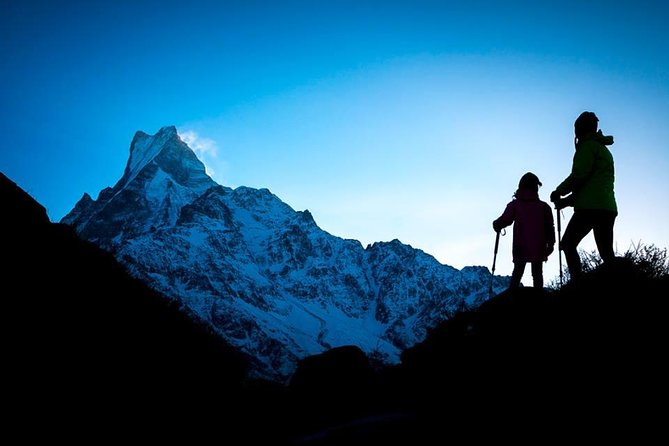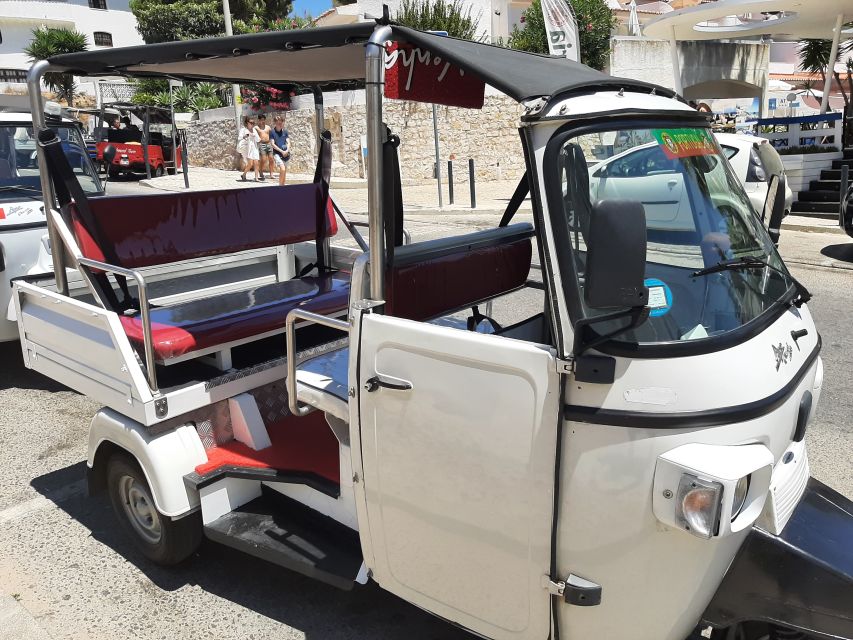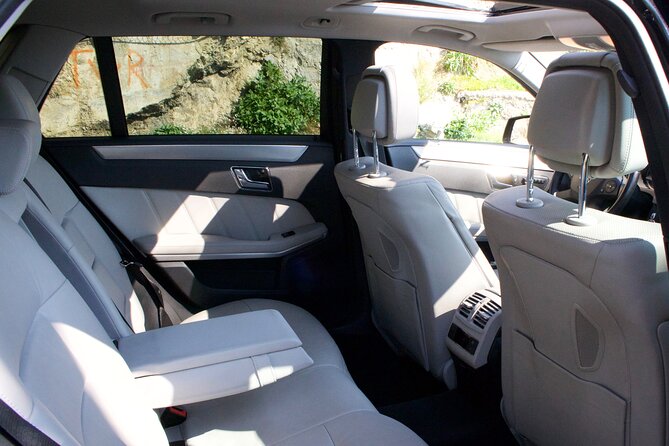The Everest Base Camp Trek is a renowned adventure that takes trekkers on an exhilarating journey to the foot of the world’s highest mountain. Offering stunning aerial views, comfortable accommodations, and delicious meals, this comprehensive package caters to the needs of intrepid explorers. Accompanied by a knowledgeable, English-speaking guide, the trek provides a sense of accomplishment for the prepared, with a private and personalized experience tailored to the group’s preferences and abilities. While not wheelchair-accessible and requiring a moderate level of fitness, the Everest Base Camp Trek promises an unforgettable experience for those ready to embark on the challenge.
Key Points
- Comprehensive trekking package from Kathmandu to the foot of the world’s highest mountain, including airport transfers, domestic flights, and permits.
- Accompanied by a government-licensed, English-speaking guide to ensure a safe and enjoyable journey.
- Offers stunning aerial views of the Himalayan landscape and eliminates the need for long ground transportation.
- Provides three daily meals, accommodations with external toilet facilities, and covers Everest National Park entry permit.
- Requires a moderate level of physical fitness and proper acclimatization, but offers a sense of accomplishment for the prepared.
It's also worth checking out some other tours and experiences nearby.
Overview
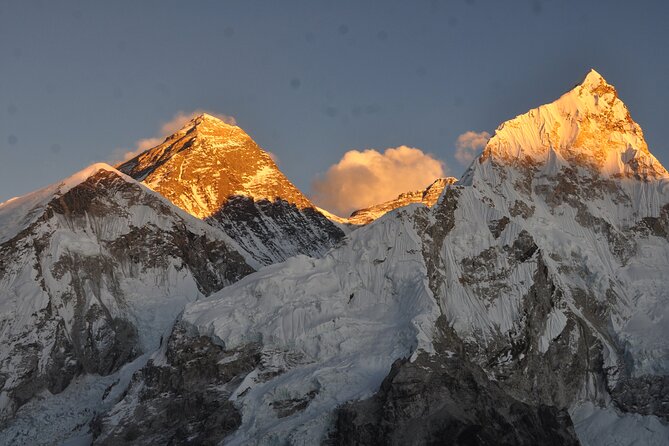
The Everest Base Camp Trek offers an exhilarating journey to the foot of the world’s highest mountain, providing trekkers with a comprehensive package that caters to their needs.
This trek departs from Kathmandu, Nepal, and includes airport pickup and drop-off by private car, van, or bus, as well as domestic airport tax. Flights from Kathmandu or Ramechap to Lukla are included, along with accommodations, meals, and an Everest National Park entry permit.
Trekkers will be accompanied by a government-licensed, English-speaking guide, and all government taxes and office expenses are covered.
While the trek isn’t wheelchair-accessible and isn’t recommended for travelers with certain health conditions, it’s suitable for those with a moderate level of physical fitness.
Flights
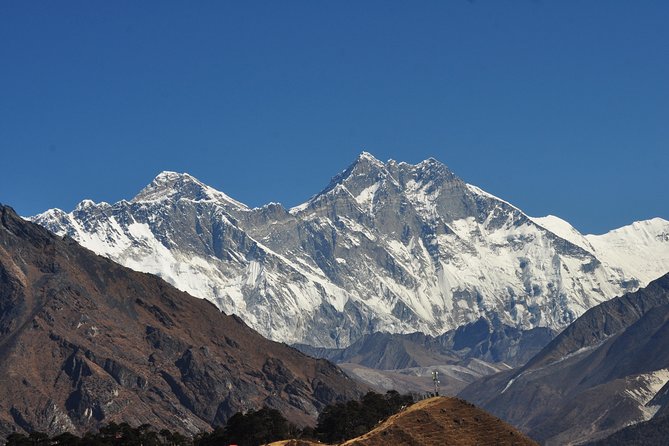
Flights from Kathmandu or Ramechap to Lukla are included in the Everest Base Camp Trek package, allowing trekkers to efficiently reach the starting point of their journey.
The flight duration is approximately 35-45 minutes, offering stunning aerial views of the Himalayan landscape.
Trekkers are responsible for their own international airfare, but the domestic flights within Nepal are handled by the tour operator.
This convenient arrangement eliminates the need for long and arduous ground transportation, saving valuable time and energy for the trekking portion of the adventure.
Whether departing from Kathmandu or the smaller Ramechap airport, the flights provide a comfortable and efficient way to begin the Everest Base Camp Trek.
Trekking Amenities
During the Everest Base Camp Trek, trekkers can expect three daily meals – breakfast, lunch, and dinner – to be provided throughout the journey. Accommodations are also included, though toilet facilities may be located outside of the rooms.
Plus, the necessary Everest National Park entry permit is covered as part of the trek package. Travelers will benefit from the guidance of a government-licensed, English-speaking guide to lead the way.
All relevant government taxes and office expenses are also accounted for in the overall cost of the trek.
The trek package includes:
- Three meals per day (breakfast, lunch, dinner)
- Accommodations with external toilet facilities
- Everest National Park entry permit
- Government-licensed, English-speaking guide
Excluded Items
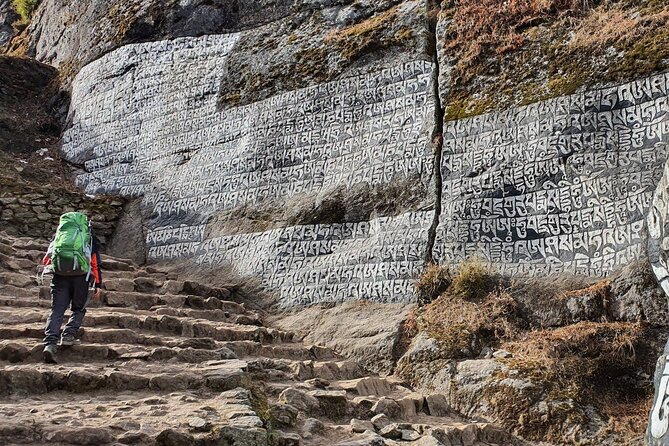
Besides the included amenities, certain items are not covered as part of the Everest Base Camp trek package. Specifically, international airfare, travel insurance, mineral water, bottled drinks, sweets, hot showers, battery charging, and Wi-Fi are all excluded from the overall cost. On top of that, trekkers are responsible for tips for their guide and porter.
| Excluded Items | Description |
|---|---|
| International Airfare | Flights to and from Nepal |
| Travel Insurance | Coverage for medical emergencies and trip cancellation |
| Mineral Water/Bottled Drinks | Hydration beyond what is provided |
| Sweets | Snacks and confections |
| Hot Shower/Battery Charge/WiFi | Additional comfort and communication services |
| Tips for Guide and Porter | Gratuity for trek staff |
Health and Safety
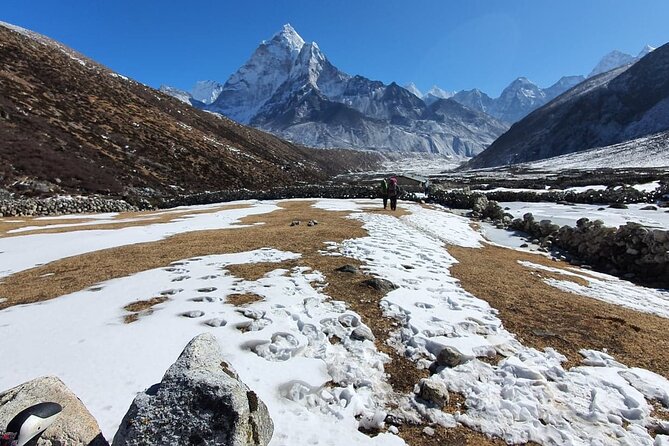
The Everest Base Camp trek isn’t wheelchair accessible and isn’t recommended for travelers with back problems, pregnant individuals, or those with heart conditions, as it requires a moderate level of physical fitness. Trekkers should be prepared for the high-altitude environment and the strenuous nature of the hike.
To ensure a safe and enjoyable experience, it’s crucial to:
- Acclimatize properly by taking rest days and avoiding rapid ascents
- Bring appropriate gear, including warm clothing, sturdy boots, and trekking poles
- Stay hydrated and consume a balanced diet throughout the trek
While the trek presents physical challenges, the breathtaking views and the sense of accomplishment make it a truly unforgettable experience for those who are prepared and in good physical condition.
Private Tour/Activity
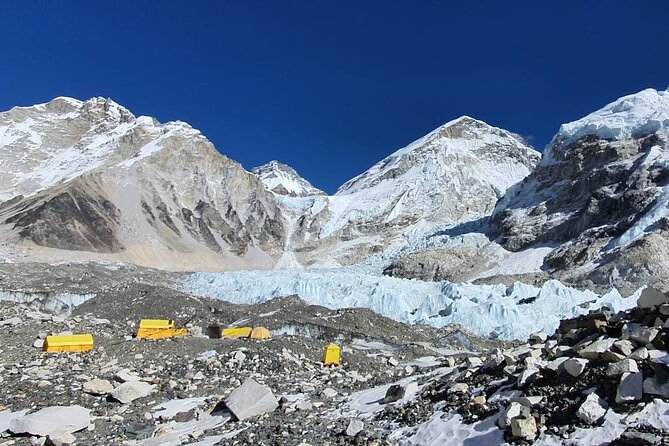
The Everest Base Camp trek is a private tour/activity, meaning only your group will participate. Travelers enjoy the exclusivity and personalized experience this format provides, as they can set their own pace, take breaks as needed, and have the undivided attention of the guide throughout the journey.
This arrangement allows for maximum flexibility and a customized experience tailored to the group’s preferences and abilities. Whether you’re a seasoned hiker or a first-time trekker, the private nature of the tour ensures you’ll receive the appropriate level of support and guidance to make the most of your Everest Base Camp adventure.
The intimate group setting also fosters camaraderie and a sense of shared accomplishment among participants.
Accommodations and Meals
Throughout the Everest Base Camp trek, accommodation is provided in cozy teahouses and lodges along the trekking route. Travelers can anticipate simple yet comfortable rooms, often featuring shared toilet facilities located outside the sleeping quarters.
Plus, three wholesome meals – breakfast, lunch, and dinner – are included daily, offering a variety of local Nepali cuisine to fuel the journey.
The meals during the trek typically include:
- Hearty Nepali staples like dal-bhat (rice and lentil curry)
- Freshly prepared vegetables and vegetarian dishes
- Occasional treats like momos (Tibetan dumplings)
Keeping energized and well-nourished is essential for the physical demands of the Everest Base Camp trek.
Government Permits and Taxes
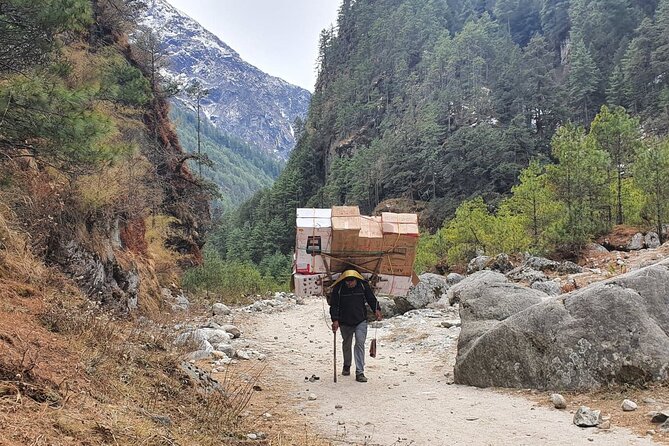
To embark on the Everest Base Camp trek, travelers must obtain the necessary government permits and pay applicable taxes. One crucial document is the Everest National Park entry permit, which ensures access to the protected region and contributes to its conservation efforts.
Plus, government taxes and office expenses are factored into the overall cost of the trek, covering administrative and logistical requirements. These permits and taxes are essential for the smooth operation of the trek, ensuring that all legal and regulatory obligations are met.
Travelers can rest assured that their participation in the Everest Base Camp trek supports the local economy and the preservation of this breathtaking natural wonder.
Here's a few more nearby tours and experiences we think you'll like.
Frequently Asked Questions
What Is the Best Time of Year to Trek to Everest Base Camp?
The best time to trek to Everest Base Camp is typically spring (March-May) or autumn (September-November) when temperatures are mild, skies are clear, and the risk of severe weather is lower. Trekkers should consider these optimal seasons for the safest and most enjoyable experience.
How Difficult Is the Everest Base Camp Trek Compared to Other Treks?
The Everest Base Camp trek is considered moderately challenging compared to other treks, requiring a good level of physical fitness and preparation. It involves high-altitude trekking and steep ascents, though it’s less technical than some other Himalayan treks.
What Is the Typical Group Size for the Everest Base Camp Trek?
The typical group size for Everest Base Camp treks is usually between 4-12 trekkers. Group sizes may vary depending on the trekking company, but this range allows for a personalized experience while maintaining efficient logistics and safety on the challenging trek.
Can I Rent or Purchase Gear Locally in Kathmandu for the Trek?
Travelers can rent or purchase necessary trekking gear locally in Kathmandu, Nepal. The city offers a wide range of equipment, from hiking boots and backpacks to sleeping bags and jackets, making it convenient to prepare for the trek.
Are There Any Specific Vaccinations or Medications Required for the Trek?
There are no specific vaccinations required for the trek, but travelers should consult their doctor about recommended medications like altitude sickness pills. It’s important to be prepared and take precautions for the high-altitude environment.
Not for you? Here's more of our most recent tour reviews happening neaby
- Discovering the Heart of Nepal A Day Tour of Kathmandu City
- Bhaktapur, Kathmandu Patan Culture Heritage Sightseeing Tour
- Everest Base Camp Heli Tour
- Manaslu Circuit Trek -14 Days
- Himalayan Adventures: 10-Day Poon Hill & Ghandruk Trek Tour
- 7 Days Nepal Tour (Kathmandu, Chitwan & Pokhara)
- Chitlang Short Trekking With Boating From Kathmandu
- Kathmandu Valley Day Tour
- From Kathmandu: 11-DAY Everest Base Camp Trek With Guide
- Everest Base Camp Trek
- 14-Day Everest Base Camp Trek
- 12 Night 13 Days Api Himal Trekking From Kathmandu
- Pokhara: Full-Day Private Tour on 7 Iconic Destination
- From Kathmandu: Delhi & Taj Mahal Trip
- Everest Gokyo Lake Trek
Recap
The Everest Base Camp Trek offers an unforgettable adventure for the prepared trekker. With stunning views, comfortable accommodations, and experienced guides, this comprehensive package ensures a personalized experience tailored to individual needs.
Though not wheelchair-accessible and requiring moderate fitness, the trek provides a sense of accomplishment for those willing to take on the challenge.
Domestic flights, permits, and other essential services are included, making it a hassle-free journey to the foot of the world’s highest mountain.

